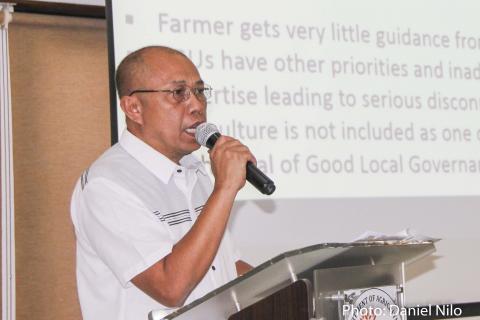Director Alfredo Aton shares the policy directions for ATI for 2019. (photo by Daniel Nilo)
DILIMAN, Quezon City—Director Alfredo Aton challenged the staff of Agricultural Training Institute (ATI) to strengthen partnerships and build linkages to address challenges that confront the food and agriculture extension services.
During the FY 2018 Annual Performance Review and FY 2019 Commitment Signing held at ATI’s central office, the current director of the Institute recognized the efforts and accomplishments in the previous year. However, he emphasized that there is a need to work closely with other organizations that have extension mandates.
“Farmers get very little guidance from agricultural extension workers because local government units have inadequate expertise in agriculture. They need extension so they can learn to produce more and increase their income,” Aton said.
To bridge the gap between agriculture extension and the farmers, Aton said that ATI must have active involvement and cooperation on key programs as part of its strategic policies. These programs are: National Development Sorghum Program, a capacity-building program for indigenous people (IP) and farmers; the Global Environmental Policy 6 Project, a six-year development project on sustainable land management with ATI as the lead in the training of trainers; and, the Special Area for Agricultural Development, another capacity-building effort for the IP under the Kabuhayan at Kaunlaran ng Kababayang Katutubo program.
He also emphasized ATI’s role on the implementation of the Rice Tariffication Law which opens up our country’s rice market to ASEAN and other countries that export rice.
“We need to set boundaries and identify roles with our partner agencies through strategic planning,” Aton explained.
Aton also highlighted the need to build strategic alliances with public and private partner agencies like the Department of Tourism, Department of Trade and Industry, Technical Education and Skills Development Authority, and Commission on Higher Education which all establish and promote farm tourism; the Department of Education for the Batang Filipino Farmers program; and other agencies that offer after-training support like the Go Negosyo and Mentor Me programs for the promotion of farm business outlets.
“We also need to harmonize and intensify our extension programs among other agencies with focus on rural credit,” Aton added.
During the event, Aton also stressed the need to strengthen ATI’s corporate image through social media and to innovate online and offline agri-extension services to reach more clients and beneficiaries.
The FY 2018 Performance Review and FY 2019 Commitment Signing was held on January 23-24, 2019. This annual event is conducted to review the Institute’s operational accomplishments, document best management practices, and set institutional policy directions for the succeeding year.

